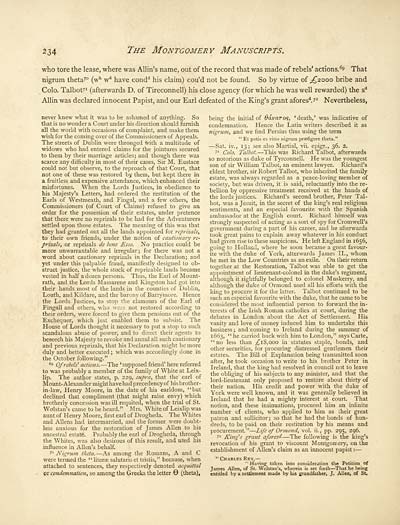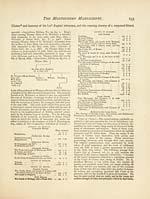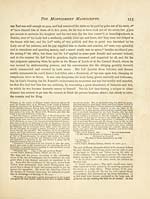Montgomery manuscripts
(248) Page 234
Download files
Complete book:
Individual page:
Thumbnail gallery: Grid view | List view

234
The Montgomery Manuscripts.
who tore the lease, where was Allin's name, out of the record that was made of rebels' actions. 69 That
nigrum theta 7 ° (w b w d have cond d his claim) cou'd not be found. So by virtue of ^2000 bribe and
Colo. Talbot? 1 (afterwards D. of Tireconnell) his close agency (for which he was well rewarded) the s d
Allin was declared innocent Papist, and our Earl defeated of the King's grant afores d .? 2 Nevertheless,
never knew what it was to be ashamed of anything. So
that is no wonder a Court under his direction should furnish
all the world with occasions of complaint, and make them
wish for the coming over of the Commissioners of Appeals.
The streets of Dublin were thronged 'with a multitude of
widows who had entered claims for the jointures secured
to them by their marriage articles; and though there was
scarce any difficulty in most of their cases, Sir M. Eustace
could not but observe, to the reproach of that Court, that
not one of these was restored by them, but kept there in
a fruitless and expensive attendance, which enhanced their
misfortunes. When the Lords Justices, in obedience to
his Majesty's Letters, had ordered the restitution of the
Earls of Westmeath, and Fingal, and a few others, the
Commissioners (of Court of Claims) refused to give an
order for the possession of their estates, under pretence
that there were no reprizals to be had for the Adventurers
settled upon those estates. The meaning of this was that
they had granted out all the lands appointed for reprisals,
to their own friends, under the notion of cautionary re-
prizals, or reprizals de bene Esse. No practice could be
more unwarrantable and irregular; for there was not a
word about cautionary reprizals in the Declaration; and
yet under this palpable fraud, manifestly designed to ob-
struct justice, the whole stock of reprizable lands became
vested in half a dozen persons. Thus, the Earl of Mount-
rath, and the Lords Massarene and Kingston had got into
their hands most of the lands in the counties of Dublin,
Louth, and Kildare, and the barony of Barrymore. Hence
the Lords Justices, to stop the clamours of the Earl of
Fingall and others, who n ere not restored according to
their orders, were forced to give them pensions out of the
Exchequer, which just enabled them to subsist. The
House of Lords thought it necessary to put a stop to such
scandalous abuse of power, and to direct their agents to
beseech his Majesty to revoke and annul all such cautionary
and previous reprizals, that his Declaration might be more
duly and better executed ; which was accordingly done in
the October following."
69 Of rebels' actions. — The 'supposed friend' here referred
to was probably a member of the family of White at Leix-
lip. The author states, p. 229, supra, that the earl of
Mount- Alexander might have had precedency of his brother-
in-law, Henry Moore, in the date of his earldom, "but
declined that compliment (that might raise envy) which
brotherly concession was ill requited, when the trial of St.
Wolstan's came to be heard." Mrs. White of Leixlip was
aunt of Henry Moore, first earl of Drogheda. The Whites
and Aliens had intermarried, and the former were doubt-
less anxious for the restoration of James Allen to his
ancestral estate. Probably the earl of Drogheda, through
the Whites, was also desirous of this result, and used his
influence in Allen's behalf.
1° Nigrum theta. — As among the Romans, A and C
were termed the " literse salutaris et tristis," because, when
attached to sentences, they respectively denoted acquittal
or condemnation, so among the Greeks the letter (theta),
being the initial of ddvaros, 'death,' was indicative of
condemnation. Hence the Latin writers described it as
nigrum, and we find Persius thus using the term
" Et potis es vitio nigrum praefigere theta."
— Sat. iv., 13; see also Martial, vii. epigr., 36. 2.
t 1 Colo. Talbot. — This was Richard Talbot, afterwards
so notorious as duke of Tyrconnell. He was the youngest
son of sir William Talbot, an eminent lawyer. Richard's
eldest brother, sir Robert Talbot, who inherited the family
estate, was always regarded as a peace-loving member of
society, but was driven, it is said, reluctantly into the re-
bellion by oppressive treatment received at the hands of
the lords justices. Richard's second brother, Peter Tal-
bot, was a Jesuit, in the secret of the king's real religious
sentiments, and an especial favourite with the Spanish
ambassador at the English court. Richard himself was
strongly suspected of acting as a sort of spy for Cromwell's
government during a part of his career, and he afterwards
took great pains to explain away whatever in his conduct
had given rise to these suspicions. He left England in 1656,
going to Holland, where he soon became a great favour-
ite with the duke of York, afterwards James II., whom
he met in the Low Countries as an exile. On their return
together at the Restoration, Talbot was able to get the
appointment of lieutenant-colonel in the duke's regiment,
although it rightfully belonged to colonel Muskerry, and
although the duke of Ormond used all his efforts with the
king to procure it for the latter. Talbot continued to be
such an especial favourite with the duke, that he came to be
considered the most influential person to forward the in-
terests of the Irish Roman catholics at court, during the
debates in London about the Act of Settlement. His
vanity and love of money induced him to undertake this
business ; and coming to Ireland during the summer of
1663, "he carried back with him to London," says Carte,
"no less than .£18,000 in statutes staple, bonds, and
other securities, for procuring distressed gentlemen their
estates. The Bill of Explanation being transmitted soon
after, he took occasion to write to his brother Peter in
Ireland, that the king had resolved in council not to leave
the obliging of his subjects to any minister, and that the
lord-lieutenant only proposed to restore about thirty of
their nation. His credit and power with the duke of
York were well known, and it was generally believed in
Ireland that he had a mighty interest at court. That
notion, and these insinuations, procured him an infinite
number of clients, who applied to him as their great
patron and sollicitor; so that he had the bonds of hun-
dreds, to be paid on their restitution by his means and
procurement." — Life of Ormond, vol. ii., pp. 295, 296.
1* King's grant aforesd- — The following is the king's
revocation of his grant to viscount Montgomery, on the
establishment of Allen's claim as an innocent papist : —
" Charles Rex, —
"Having taken into consideration the Petition of
James Allen, of St. Wolstan's, wherein is set forth — That he being
entitled by a settlement made by his grandfather, J. Allen, of St,
The Montgomery Manuscripts.
who tore the lease, where was Allin's name, out of the record that was made of rebels' actions. 69 That
nigrum theta 7 ° (w b w d have cond d his claim) cou'd not be found. So by virtue of ^2000 bribe and
Colo. Talbot? 1 (afterwards D. of Tireconnell) his close agency (for which he was well rewarded) the s d
Allin was declared innocent Papist, and our Earl defeated of the King's grant afores d .? 2 Nevertheless,
never knew what it was to be ashamed of anything. So
that is no wonder a Court under his direction should furnish
all the world with occasions of complaint, and make them
wish for the coming over of the Commissioners of Appeals.
The streets of Dublin were thronged 'with a multitude of
widows who had entered claims for the jointures secured
to them by their marriage articles; and though there was
scarce any difficulty in most of their cases, Sir M. Eustace
could not but observe, to the reproach of that Court, that
not one of these was restored by them, but kept there in
a fruitless and expensive attendance, which enhanced their
misfortunes. When the Lords Justices, in obedience to
his Majesty's Letters, had ordered the restitution of the
Earls of Westmeath, and Fingal, and a few others, the
Commissioners (of Court of Claims) refused to give an
order for the possession of their estates, under pretence
that there were no reprizals to be had for the Adventurers
settled upon those estates. The meaning of this was that
they had granted out all the lands appointed for reprisals,
to their own friends, under the notion of cautionary re-
prizals, or reprizals de bene Esse. No practice could be
more unwarrantable and irregular; for there was not a
word about cautionary reprizals in the Declaration; and
yet under this palpable fraud, manifestly designed to ob-
struct justice, the whole stock of reprizable lands became
vested in half a dozen persons. Thus, the Earl of Mount-
rath, and the Lords Massarene and Kingston had got into
their hands most of the lands in the counties of Dublin,
Louth, and Kildare, and the barony of Barrymore. Hence
the Lords Justices, to stop the clamours of the Earl of
Fingall and others, who n ere not restored according to
their orders, were forced to give them pensions out of the
Exchequer, which just enabled them to subsist. The
House of Lords thought it necessary to put a stop to such
scandalous abuse of power, and to direct their agents to
beseech his Majesty to revoke and annul all such cautionary
and previous reprizals, that his Declaration might be more
duly and better executed ; which was accordingly done in
the October following."
69 Of rebels' actions. — The 'supposed friend' here referred
to was probably a member of the family of White at Leix-
lip. The author states, p. 229, supra, that the earl of
Mount- Alexander might have had precedency of his brother-
in-law, Henry Moore, in the date of his earldom, "but
declined that compliment (that might raise envy) which
brotherly concession was ill requited, when the trial of St.
Wolstan's came to be heard." Mrs. White of Leixlip was
aunt of Henry Moore, first earl of Drogheda. The Whites
and Aliens had intermarried, and the former were doubt-
less anxious for the restoration of James Allen to his
ancestral estate. Probably the earl of Drogheda, through
the Whites, was also desirous of this result, and used his
influence in Allen's behalf.
1° Nigrum theta. — As among the Romans, A and C
were termed the " literse salutaris et tristis," because, when
attached to sentences, they respectively denoted acquittal
or condemnation, so among the Greeks the letter (theta),
being the initial of ddvaros, 'death,' was indicative of
condemnation. Hence the Latin writers described it as
nigrum, and we find Persius thus using the term
" Et potis es vitio nigrum praefigere theta."
— Sat. iv., 13; see also Martial, vii. epigr., 36. 2.
t 1 Colo. Talbot. — This was Richard Talbot, afterwards
so notorious as duke of Tyrconnell. He was the youngest
son of sir William Talbot, an eminent lawyer. Richard's
eldest brother, sir Robert Talbot, who inherited the family
estate, was always regarded as a peace-loving member of
society, but was driven, it is said, reluctantly into the re-
bellion by oppressive treatment received at the hands of
the lords justices. Richard's second brother, Peter Tal-
bot, was a Jesuit, in the secret of the king's real religious
sentiments, and an especial favourite with the Spanish
ambassador at the English court. Richard himself was
strongly suspected of acting as a sort of spy for Cromwell's
government during a part of his career, and he afterwards
took great pains to explain away whatever in his conduct
had given rise to these suspicions. He left England in 1656,
going to Holland, where he soon became a great favour-
ite with the duke of York, afterwards James II., whom
he met in the Low Countries as an exile. On their return
together at the Restoration, Talbot was able to get the
appointment of lieutenant-colonel in the duke's regiment,
although it rightfully belonged to colonel Muskerry, and
although the duke of Ormond used all his efforts with the
king to procure it for the latter. Talbot continued to be
such an especial favourite with the duke, that he came to be
considered the most influential person to forward the in-
terests of the Irish Roman catholics at court, during the
debates in London about the Act of Settlement. His
vanity and love of money induced him to undertake this
business ; and coming to Ireland during the summer of
1663, "he carried back with him to London," says Carte,
"no less than .£18,000 in statutes staple, bonds, and
other securities, for procuring distressed gentlemen their
estates. The Bill of Explanation being transmitted soon
after, he took occasion to write to his brother Peter in
Ireland, that the king had resolved in council not to leave
the obliging of his subjects to any minister, and that the
lord-lieutenant only proposed to restore about thirty of
their nation. His credit and power with the duke of
York were well known, and it was generally believed in
Ireland that he had a mighty interest at court. That
notion, and these insinuations, procured him an infinite
number of clients, who applied to him as their great
patron and sollicitor; so that he had the bonds of hun-
dreds, to be paid on their restitution by his means and
procurement." — Life of Ormond, vol. ii., pp. 295, 296.
1* King's grant aforesd- — The following is the king's
revocation of his grant to viscount Montgomery, on the
establishment of Allen's claim as an innocent papist : —
" Charles Rex, —
"Having taken into consideration the Petition of
James Allen, of St. Wolstan's, wherein is set forth — That he being
entitled by a settlement made by his grandfather, J. Allen, of St,
Set display mode to:
![]() Universal Viewer |
Universal Viewer | ![]() Mirador |
Large image | Transcription
Mirador |
Large image | Transcription
Images and transcriptions on this page, including medium image downloads, may be used under the Creative Commons Attribution 4.0 International Licence unless otherwise stated. ![]()
| Histories of Scottish families > Montgomery manuscripts > (248) Page 234 |
|---|
| Permanent URL | https://digital.nls.uk/95235903 |
|---|
| Description | A selection of almost 400 printed items relating to the history of Scottish families, mostly dating from the 19th and early 20th centuries. Includes memoirs, genealogies and clan histories, with a few produced by emigrant families. The earliest family history goes back to AD 916. |
|---|

